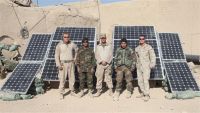WASHINGTON, May 5, 2011 — There’s a peculiar sight on Forward Operating Base Jackson in the Sangin district of Afghanistan’s Helmand province. The base is one of several in southern Afghanistan where the Marine Corps has set up solar panels and uses solar blankets as sources of renewable energy.
Col. Robert “Brutus” Charette Jr., director of expeditionary energy for the Marine Corps, is working to ensure that deploying such sources of renewable energy become standard procedure. But he admits it hasn’t come easy.
When 3rd Battalion, 5th Marine Regiment, received orders last year to deploy to Afghanistan, experiments in environmentalism did not come to mind.
“When we told them they’d be taking renewables to the battlefield, they were not amused,” Charette told an audience at an energy, environment, defense and security conference here yesterday.
That was before they trained in renewable energy at Marine Corps Air Ground Combat Center in Twentynine Palms, Calif. — before they’d proven the Corps’ new position that resource efficiency equals combat effectiveness.
At first, the Marines grudgingly accepted the solar panels and other renewable energy sources, saying they could go on “a slow boat to Afghanistan,” Charette said. After they trained with the equipment and experienced the efficiency of lighter packs and less reliance on resupplies, they said to put all of it on the planes, he said. “That’s when I knew we had something,” he added.
Today, at least two forward operating bases in Afghanistan are powered entirely by solar energy, and several others get at least 90 percent of their energy from the sun. Marine Corps leaders are so pleased with the outcome that they’ve written renewable energy into training plans and doctrine — something Charette said he hopes will become joint practice with other services.
“Today on the battlefield, we treat energy and water like it’s air, like it will always be there,” Charette said. “Logistics guys do such a tremendous job supplying warfighters that we don’t pay attention.”
The colonel added there still “are a lot of gaps to fill” to create an environment where the services have a steady supply of renewable resources from industry, and a system in place for fielding, training and using them.
“We need a methodical approach to doing it,” he said. The results on the battlefield, though, are good enough to be an incentive. Six solar panels at Forward Operating Base Jackson can keep at least 17 computers and 15 lighting units running throughout the night. A Marine company on a three-day foot patrol uses solar blankets in place of radio batteries, savings hundreds of pounds from packs and thousands of dollars, Charette said.
When Marines in Helmand were given a solar refrigerator that kept water at 40 degrees on a 130-degree day, he said, the unit ordered 10 of them. As an enduring example of the Marines’ energy initiatives in Helmand, they have shared their findings — and equipment — with local Afghans. “Without energy, they’re never going to be able to stand on their own,” Charette noted.
While Helmand residents “showed no interest in biofuels,” he said, they like the solar panels and blankets, which are providing much-needed energy.
By 2025, the Marine Corps plans to cut in half the amount of energy each Marine consumes on the battlefield. By writing alternative energy uses into service policies and procedures, Charette said, “it ensures we truly do change the way we do business.”
Source:
U.S. Department of Defense
Office of the Assistant Secretary of Defense (Public Affairs)

 von
von 
